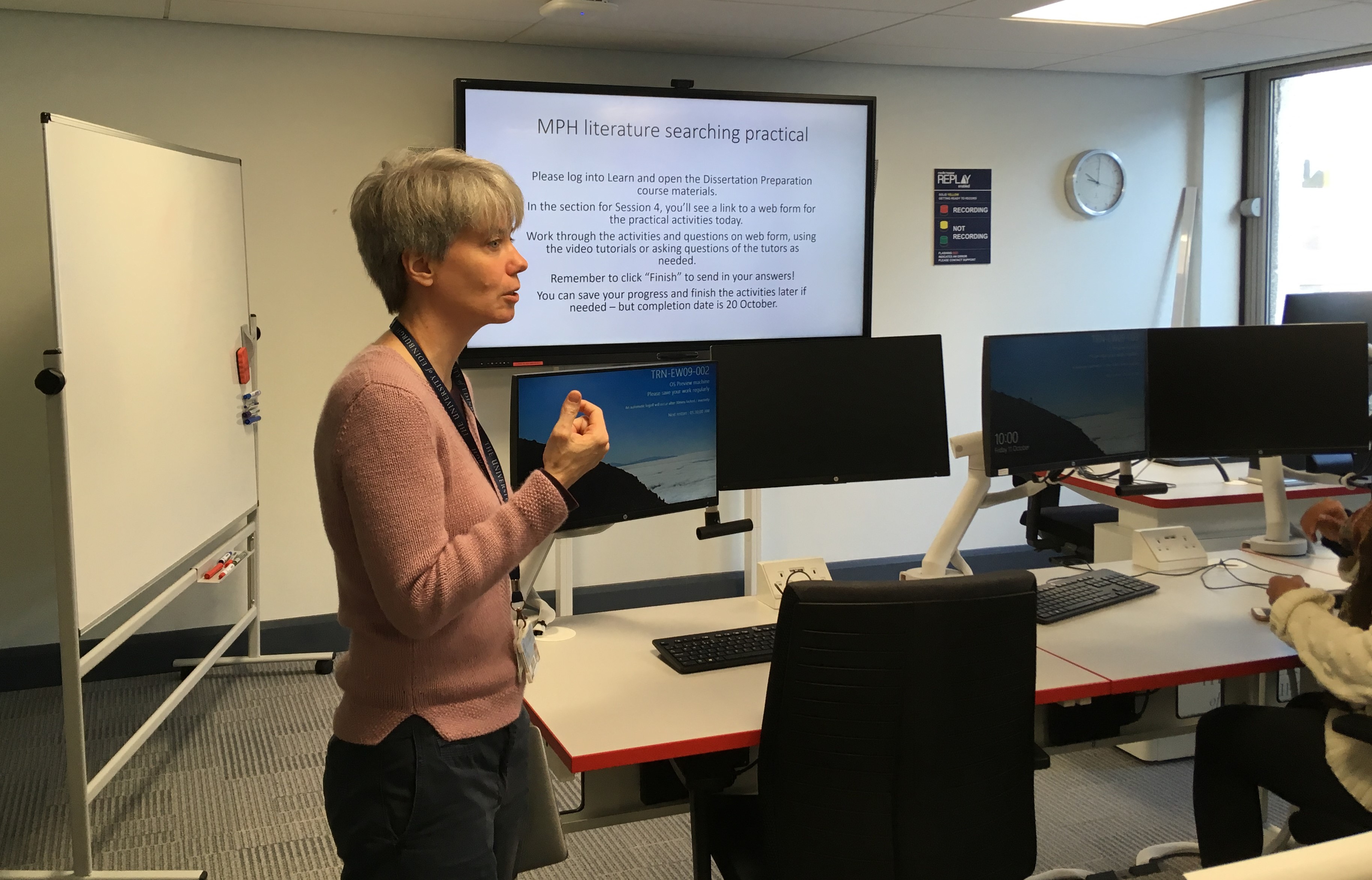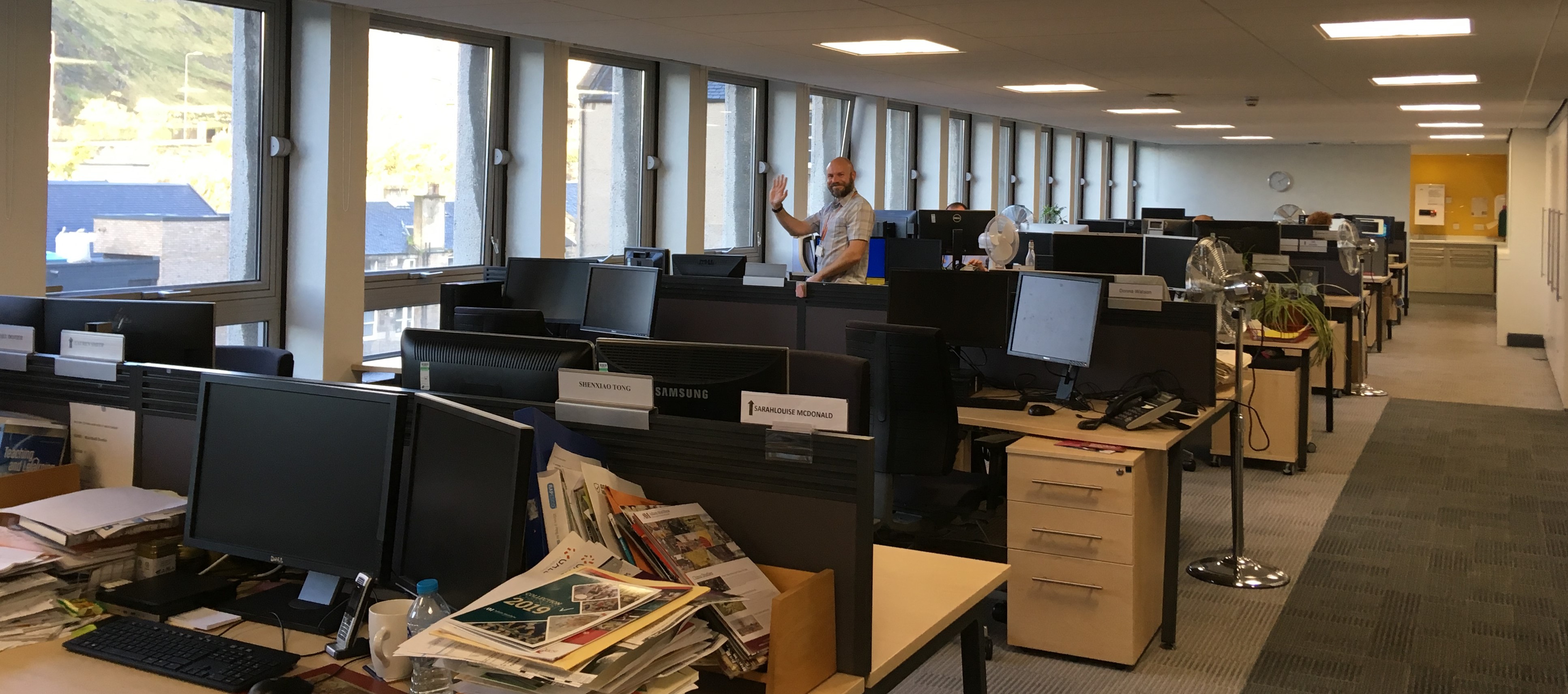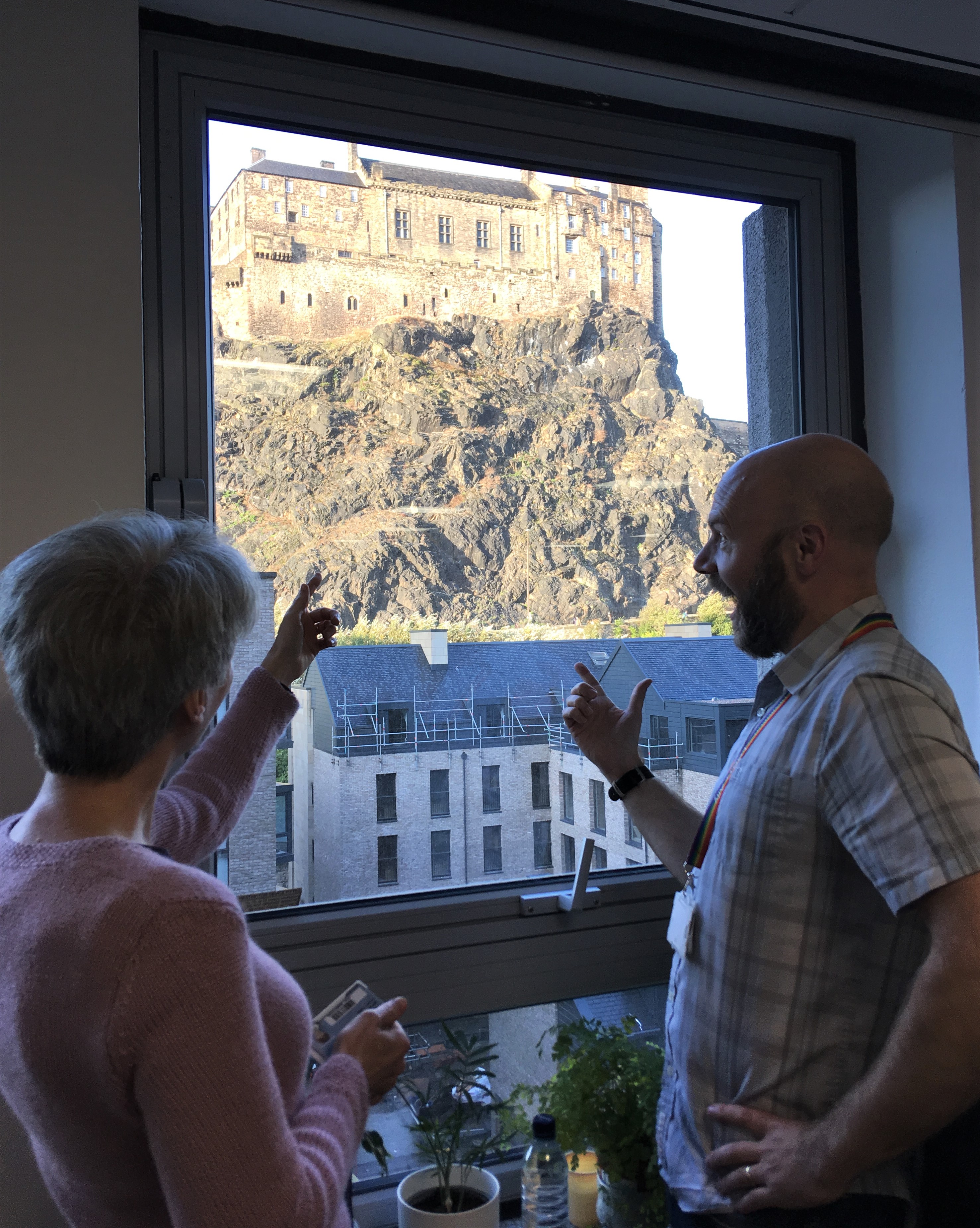Tiedonhakutaidot, avoin tiede ja tukimusdatapalvelut Edinburghin yliopistossa – raportti opintovierailusta | Information skills, open research, and research data support at the University of Edinburgh – a report of a study visit
(Please, scroll down to read in English.)
Vierailin perjantaina 11.10.2019 Edinburghin yliopiston kirjastossa (Library and University Collections). Osallistuin ensin paikallisen kollegan Marshall Dozierin (College Lead for Library Academic Support, Medicine & Veterinary Medicine) opetukseen. Master of Public Health -ohjelman ensimmäisen vuoden opiskelijoiden käytännön harjoitukset pidettiin suuren Argyle House -rakennuksen moderneissa tietokoneluokissa. Mukana oli myös koulutusohjelman johtaja Niall Anderson (Programme Director, MPH & Programme Co-Director, MPH online). Oli todella hyödyllistä, että hän oli mukana harjoituksia ohjaamassa, koska osa opiskelijoista tarvitsi vielä ohjausta aiheidensa analysointiin ja rajaamiseen.
Marshall Dozier flippasi tämän opetuksen ensimmäistä kertaa. Tuoreiden maisteriopiskelijoiden oli(si) pitänyt katsoa ennen harjoituksia kolme videota: yksi kirjallisuuskatsauksista, toinen tiedonhausta ja kolmas tietokannoista. Luokkatilanteessa opiskelijat tekivät verkkotehtävää, jossa heidän piti ensin selostaa hakunsa (opinnäytteensä) aihe ja muodostaa hakulauseita sekä tehdä hakuja ja viedä viitteitä EndNote-viitteidenhallintajärjestelmään. Tarkoitukseni oli vain seurata opetustilannetta, mutta löysin itseni pian opastamasta Boolen logiikkaa. hakusanojen katkaisemista ja muuta tiedonhaun logiikkaa. Miellyttävä kokemus.
Olin juuri edellisellä viikolla opettanut tiedonhaun perusteita omille Master of Public Health -opiskelijoillemme, joten työ tuntui tutulta. Edinburghissa opiskelijoita vain on melkoisesti enemmän, kaikkiaan 84, joista kolmisenkymmentä oli tässä ryhmätilanteessa, jakautuneina kahteen vierekkäiseen luokkatilaan, joissa kiersimme ohjaamassa opastusta tarvitsevia. Osa teki tehtävät täysin ilman apua, mutta joidenkin kanssa opastukseen meni paljonkin aikaa.

Iltapäivällä pääsin mukaan Theo Andrew’n (Scholarly Communications Manager) sisäiseen koulutukseen, jossa hän kertoi ryhmälle uusia tutkimuksen tuen ja julkaisemisen parissa työskenteleviä yliopistolaisia tieteellisestä viestinnästä ja avoimesta tieteestä Edinburghin yliopistossa. Aiheet olivat kirjaston tutkimuksen tuen henkilöstö ja orgnaisaatio, tutkimustietojärjestelmä (Pure), julkaisuarkisto (Dspace), Open Journals System (OJS), altmetriikka & bibliometrikka, tekijänoikeudet, avoin julkaiseminen, rahoittajien oa-käytännöt, tutkimuksen arviointi (REF2021) ja Plan S. Tuhti tietopaketti siis.
Scholarly Communications -tiimiin kuuluu neljä henkilöä. He kouluttavat ja ylläpitävät palveluita sekä saavat vuodessa noin 2700 yhteydenottoa. Yliopisto tuotti 1.4.2016-28.2.2019 yhteensä 16595 julkaisua tai muuta tuotosta, joista 91,9 % on avoimesti saatavilla. Avoimuuden korkeaa lukemaa selittää muun muassa se, että REF-arviointiin hyväksytään vain oa-julkaisut, mutta Edinburghin yliopisto edistää muutenkin avointa tiedettä ja tutkimusta erittäin voimakkasti ja näkyvästi. APC-maksuja ei enää makseta hybridi-OA:sta, vaan panostetaan ”lue & julkaise” sopimuksiin (esim. Springer Compact Agreement) ja suositaan välitöntä vihreää OA:ta (UK Scholarly Communications Licence).
Päivän lopuksi keskustelin vielä Martin Donnellyn (Research Data Support) ja Eleni Kotoulan (Lead Digital Research Services Facilitator) kanssa tutkimusdataan liittyvistä palveluista. Suomessa käytettävä tutkimusaineistonhallintasuunitelmatyökalu DMPTuuli on kotoisin Edinburghista (DMPonline). Heillä on tutkimusdatan hallintaan ja ja säilytykseen kattavat palvelut ja välineet. He myös järjestävät vuosittain sisäisen konferenssin Dealing with Data. Digitaaliset tutkimuspalvelut (Digital Research Services) on laaja kokonaisuus, joka tarjoaa data- ja ohjelmistopalveluita ja välineitä tutkimuksen kaikissa vaiheissa.

On Friday 11th October 2019, I visited the Library and University Collections of the University of Edinburgh. First I attended a practical session taught by Marshall Dozier (College Lead for Library Academic Support, Medicine & Veterinary Medicine). Information skills exercises for the first-year students of the Master of Public Health programme were held in modern computer classrooms in the large Argyle House building. It was really helpful that the Programme Director of the MPH Niall Anderson (also Programme Co-Director of MPH Online) was present in the session as some of the students needed guidance in analysing and defining their topic, too, not just information retrieval.
Marshall Dozier used the flipped classroom model for this course for the first time. New graduate students were to watch three videos before the exercise: one about literature reviews, one about information retrieval, and one about databases. In the classroom, students completed an online assignment where they first had to explain the topic of their search (dissertation) and to formulate search queries, as well as to conduct searches and to export the references to the EndNote reference management system. My intention was just to observe the teaching, but I ended up explaining Boolean logic, truncating keywords and other information retrieval basics. A pleasant experience. The week before, I had taught the information skills to our Master of Public Health students, so it felt familiar. In Edinburgh, the number of students (84) is much bigger than at UEF. Thirty of them attended this session, divided into two classrooms where we circulated to guide those in need. Some did their searches on their own, but some took a lot of time to guide.
In the afternoon, I attended Theo Andrew’s (Scholarly Communications Manager) in-house training. He told a group of new research support and publishing staff members at the University of Edinburgh about scientific communication and open science. Topics included the staffing and the organisation of the Library Research Support, Current Research Information System (Pure), Institutional Repository (Dspace), Open Journals System (OJS), Altmetrics & Bibliometrics, Copyright, Open Access Policy Landscape, Funders’ Open Access policies, Research Excellence Framework (REF2021) and Plan S. A lot of information.
The Scholarly Communications team consists of four people. They train and maintain services and receive about 2,700 calls a year. From April 1, 2016, to February 28, 2016, the University produced a total of 16595 outputs, 91.9% of which are open access. The high level of OA is explained, among other things, by the fact that OA is demanded by REF, but the University of Edinburgh also promotes open science and research in a very powerful and visible way. They stopped paying APCs for individual hybrid-OA, are investigating in Read & Publish deals (eg. Springer Compact Agreement) and have preference for immediate Green OA (UK Scholarly Communications License).
At the end of the day, I talked with Martin Donnelly (Research Data Support) and Eleni Kotoula (Lead Digital Research Services Facilitator) about research data services. The DMPTuuli research data management tool used in Finland comes from Edinburgh (DMPonline). They have comprehensive services and tools for managing and storing research data. They also hold an annual internal conference called Dealing with Data. Digital Research Services is a comprehensive entity that provides data and software services and tools at all stages of research.

Tuulevi Ovaska
erityistietoasiantuntija | communications coordinator & information specilialist
Opetus- ja tietopalvelut | Training & information services